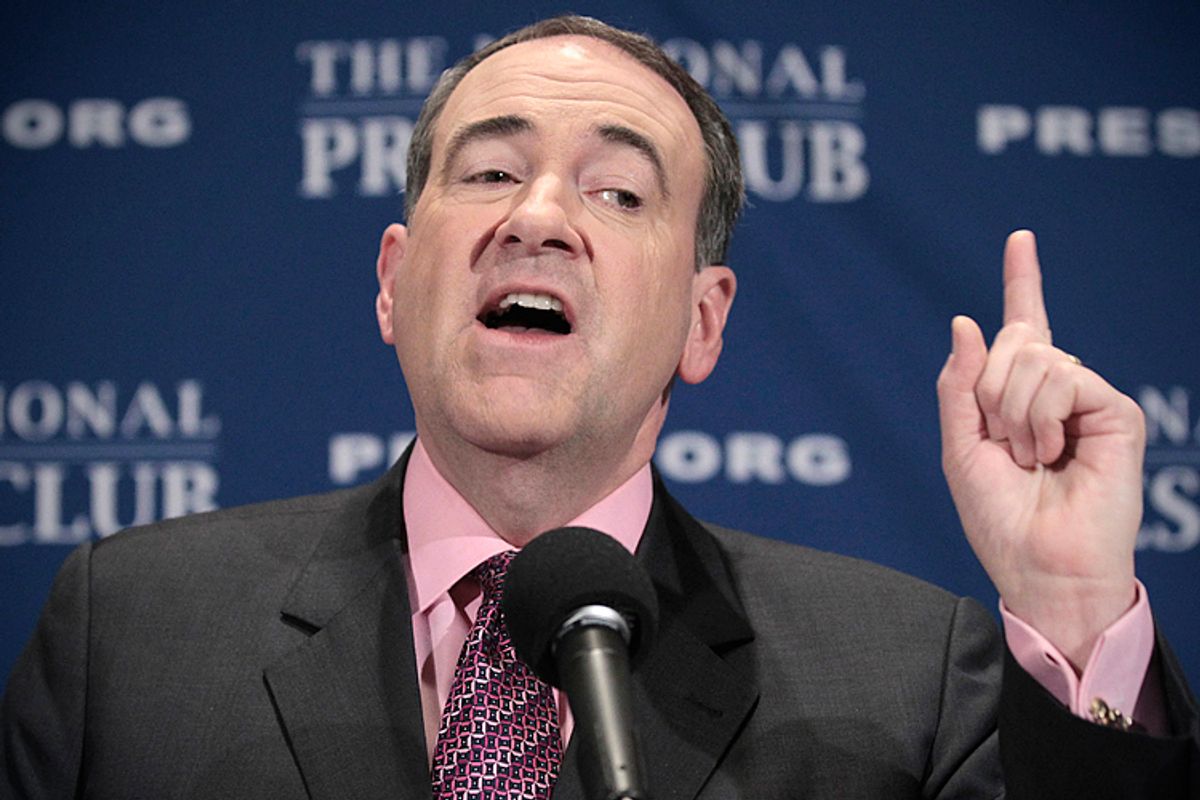In 2008, former Arkansas Gov. Mike Huckabee vaulted into presidential contention when his popularity among social conservatives propelled him to victory in the Iowa caucuses. But short on cash and lacking the national campaign infrastructure boasted by competitors like John McCain and Mitt Romney, Huckabee's campaign quickly flamed out. The erstwhile candidate managed to parlay his better-than-expected showing into a new career as a Fox News host -- a lucrative role Huckabee couldn't bring himself to abandon in 2011, when he passed on a 2012 presidential bid despite polls showing he'd be a top-tier GOP candidate. But as the 2016 campaign rapidly approaches, Huckabee is once again contemplating a run for the White House -- and despite persistent doubts that he has the staying power to capture the GOP nod, he deserves to be taken seriously this time.
Skeptics of a Huckabee bid point to his public flirtation with a 2012 run, which all turned out to be for naught. But there's a crucial difference between 2012 and 2016. Despite keeping the door to a 2012 campaign open, Huckabee never actually laid the groundwork for another bid. He skipped high-profile confabs like the Conservative Political Action Conference, raised little money for his political action committee, and even needled the Tea Party, dinging the critical GOP constituency's emphasis on "ultraorthodoxy."
This time, however, Huckabee is making moves consistent with a serious White House run. The Washington Post's Robert Costa and Tom Hamburger report this morning that the former Baptist preacher plans to take "more than 100 pastors and GOP insiders from early primary states on a 10-day overseas trip with stops in Poland and England." Dubbed the “Reagan, Thatcher, Pope John Paul II tour,” Huckabee is pitching the trip as a "spiritual awakening," indicating that he hopes the trip will both strengthen his ties to key social conservatives and burnish his foreign policy credentials. Of course, Huckabee also made high-profile foreign trips ahead of 2012, but as he ponders a political comeback, he's also working to build a viable infrastructure this time. Costa and Hamburger note that he has formed a new advocacy group called America Takes Action, huddled with advisers to game out the 2016 campaign, and plans to meet with GOP fundraisers in Las Vegas, New York and California.
Cultivating ties to the GOP donor class will be essential for Huckabee, as he looks to avoid a repeat of his underfunded 2008 campaign. And he's already met with some early success, forming a close bond with billionaire casino magnate Sheldon Adelson, who along with his wife poured $20 million into a super PAC backing Newt Gingrich in 2012 and spent nearly $100 million supporting other GOP candidates that year. Adelson recently awarded Huckabee the Adelson Defender of Israel award, and Huckabee has made it clear that he'd like to win the megadonor's support if he proceeds with a campaign. As Gingrich's unsuccessful campaign attests, the generosity of a billionaire like Adelson isn't sufficient to win the GOP nomination. But Adelson's funds kept Gingrich in contention for far longer than the former House speaker would otherwise have been a viable candidate, and his financial backing may well help Huckabee compete with bigwigs like Chris Christie and Jeb Bush.
Donors surveying the 2016 field can hardly ignore polls that show Huckabee in a strong position among Republican voters. While it's early yet, public polling places Huckabee near the top of the GOP's field; according to RealClearPolitics' polling average, he's in a statistical tie for first place with Rand Paul, Bush, Christie and Paul Ryan. Huckabee certainly stands an excellent chance of once again winning the Iowa caucuses, where RCP gives him a 6.2 point lead over Ryan, his nearest competitor. What's more, his net favorability rating is the highest among the Republican pack, although a surprising number of voters remain unfamiliar with him.
None of this is to say that Huckabee will be the Republican nominee. For one thing, the field is likely to include plenty of candidates -- like Rick Santorum, Ben Carson, Ted Cruz and Bobby Jindal -- who appeal to the same social conservative constituency that Huckabee does. And though Huckabee may manage to win over some Republican plutocrats this time around, the party establishment is hungry for a candidate who can actually win the presidency -- particularly after eight years of President Obama. For all his folksy rhetoric and down-home charm, it's hard to see Huckabee, whose social views are positively retrograde, as that candidate. He recently threatened to leave the GOP if party leaders showed too little commitment to denying gay people equal rights. Moreover, his charge this January that Democrats believe women are "helpless without Uncle Sugar coming in and providing or them a prescription each month for birth control because they cannot control their libido" underscores the difficulty he would have winning over women voters, to say nothing of male voters who find that kind of rhetoric gross and creepy.
Flawed as Huckabee may be, though, it's not as if the GOP contest will include any candidates without serious problems -- whether with public relations, criminal inquiries or contentious relations with the party base. I wouldn't place my bets on him just yet, but at this stage, Huckabee is well-positioned to at least perform better than he did six years ago.



Shares